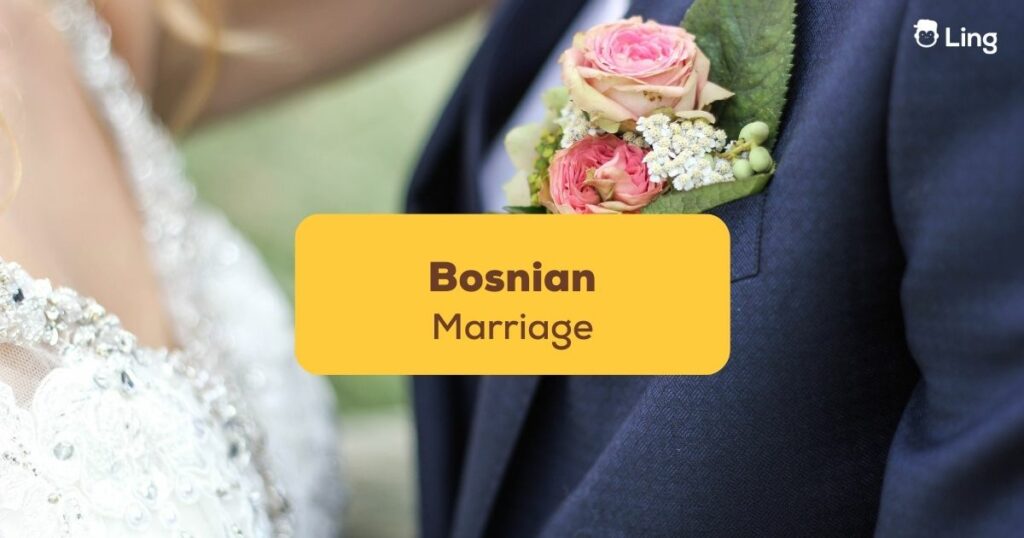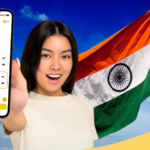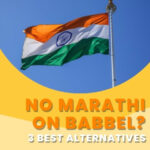If you are lucky enough to be invited to a Bosnian marriage ceremony, you should know a few things before the big day. There is no better way of understanding the culture of another country than by attending a wedding after all. In this blog, we will explore what you can expect and the traditions behind marriages in this wonderful country. Let’s begin!
A Complex History
Like many other cultural practices, Bosnian marriage reflects the country’s complex history, diverse religious traditions, and social norms. Bosnia and Herzegovina is a country located in Southeast Europe, where Muslims, Orthodox Christians, and Catholics coexist. This religious and cultural diversity is reflected in how Bosnians approach marriage, which can vary depending on religious affiliation, regional customs, and individual preferences. So, let’s dive in and look at the various aspects of Bosnian marriage, including the engagement process, wedding ceremonies, and family dynamics.
Getting Engaged In Bosnia
The engagement process is an essential part of Bosnian marriage, and a series of rituals characterize it. Traditionally, the groom’s family visits the bride’s family to ask for her hand in marriage. This is usually done by the groom’s father or an older male relative. The visit is called “Kina,” a formal event where the two families meet to discuss the engagement.
During the Kina, the groom’s family brings gifts for the bride’s family, such as sweets, coffee, and Turkish delight. The bride’s family, in return, offers refreshments and a warm welcome. Once the formalities are over, the couple is officially engaged. However, the engagement period can last for several months, during which time the guy and his fiancee can get to know each other better and plan their wedding party. It also gives the betrothed families time to get to know each other better.
Bosnian Wedding Ceremonies
Bosnian wedding ceremonies are diverse, reflecting the country’s religious and cultural diversity. Muslim weddings, for example, follow Islamic customs and include a religious ceremony led by an imam. Catholic weddings are held in a church and are presided over by a priest, while an Orthodox marriage ceremony is held in a church and is presided over by a bishop.
Despite these differences, there are several common elements in Bosnian weddings. One of the most important is the “Svadba,” the wedding reception. The Svadba is a jolly event that can last for several days (the first day is usually taken up with religious traditions and rituals, with the second devoted to the reception), and it involves feasting, dancing, and socializing. Non-religious weddings usually take place on a single day.
Bosnian Wedding Dress
Another important aspect of Bosnian weddings is the attire. Brides usually wear a white dress, while grooms wear suits or traditional clothing depending on their religion and region. It is also common for the bride to wear a veil, which the groom lifts during the ceremony. In Muslim weddings, the bride wears a hijab or a headscarf, while in Catholic and Orthodox weddings, the bride wears a tiara.
The Role Of The Family
Family plays a central role in Bosnian marriage, and it is not uncommon for Bosnian women and men to live with their parents or extended family after deciding to marry. Family support is essential during the engagement and wedding planning process, and parents often help with the preparations and contribute financially.
In addition to providing financial and logistical support, family members also play an essential role in the wedding ceremony. In Muslim weddings, the bride’s father or brother gives her away to the groom during the “nikah” ceremony. In Catholic weddings, the father often walks the bride down the aisle and gives her out to the groom.
After The Big Day
After the wedding, the couple typically moves in with the groom’s family, where they are expected to contribute to the household and respect the family’s traditions. However, this is changing in urban areas, where young couples are more likely to live independently.
Some Typical Bosnian Wedding Traditions
Henna
Bosnian women will often have a henna party. This will be attended by the bride’s best friends and closest family. The bride’s mother will decorate her daughter’s hands with henna while everyone else enjoys a sing-song about the happiness of marriage and creating a new family.
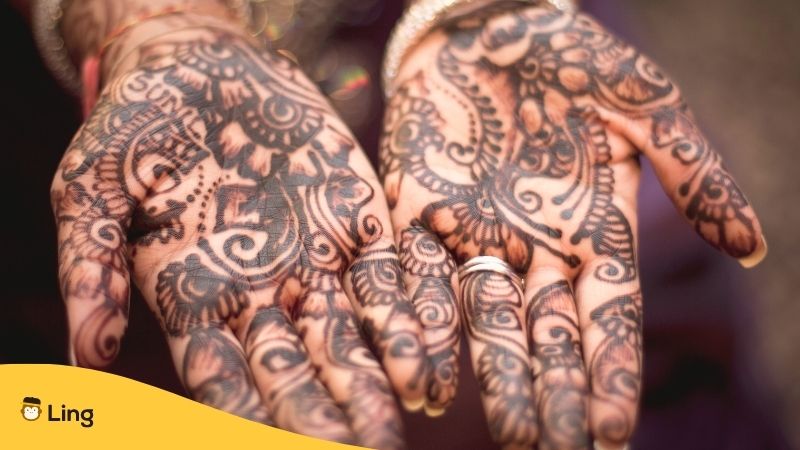
Groom’s Breakfast
For the man, the day of his nuptials will kick off with breakfast without the girls. Male family members will gather to swap stories and prepare the groom for his big day. At noon, the men will hop into a limousine and head to the bride’s house.
Bartering For The Bride
A rather unusual tradition is the part of the day when a close male relative of the bride refuses to hand her over to the groom until the best man comes up with enough cash to pay a sort of ransom for the bride on behalf of the groom.
Pogaca
Another important tradition in weddings is the “pogaca,” which is a large, round loaf of bread that is baked for the wedding. The pogaca is decorated with intricate designs and symbols, such as the bride and groom’s initials, and is often used as a centerpiece for the reception.
During the reception, guests will also be treated to a lavish feast, which typically includes traditional Bosnian dishes such as cevapi (grilled meatballs), pita (a type of pastry filled with meat or cheese), and baklava (a sweet pastry made with layers of phyllo dough and honey).
Tuzlanski Zvizduk
One of the most important customs is the “tuzlanski zvizduk,” which is a loud horn blast that signals the start of the reception. This is followed by the “kolo,” a traditional circle dance performed by the bride, groom, and their families. The kolo dance is accompanied by live music, traditional songs, and folk music, which is typically played on traditional Bosnian instruments such as the accordion, the tamburica, and the dvojnice.
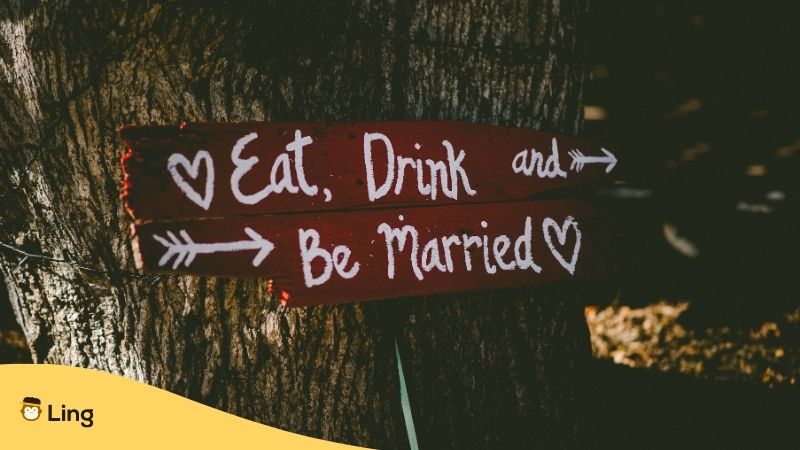
Bosnian Wedding Vocabulary
Now we know everything there is to know about Bosnian marriages, let’s have a look at some helpful wedding words.
| English | Bosnian |
| Bride | Nevesta |
| Groom | Mladoženja |
| Maid of Honour | Devojčica |
| Best man | Najbolji čovjek |
| Wedding party | Svadbi |
| Aisle | Aisle |
| Wedding ceremony | Svadbene svečanosti |
| Wedding vows | Vjenčani zavjeti |
| Hor d’œuvres | Hor d’œuvres |
| Wedding reception | Svadbeni prijem |
| Toasts | Zdravice |
| Top table | Gornji sto |
| Engagement ring | Verenički prsten |
| Wedding ring | Burma |
| Wedding dress | Vjenčanica |
| Veil | Veo |
| Bouquet | Bouquet |
| Newlyweds | Mladenci |
| Elopement | Elopement |
| Engagement | Veridba |
| Gift registry | Registar poklona |
| Guest book | Knjiga gostiju |
| Honeymoon | Medeni mjesec |
Learn More Bosnian Wedding Words With Ling App

If you are attending a wedding in Bosnia or want to learn more about the language, then the Ling app is just what you are looking for. Learning Bosnian with Ling is fun and easy, with games, puzzles, and quizzes to keep you entertained as you learn. With Ling on your phone, you will always be ready to impress with your linguistic skills. Download the Ling app now at Google Play and App Store to try it out!
